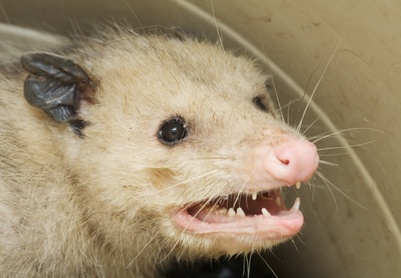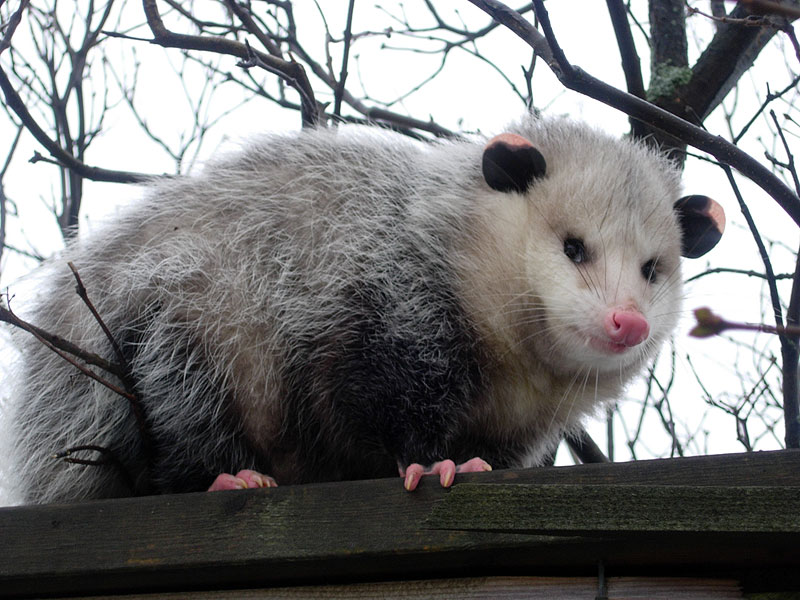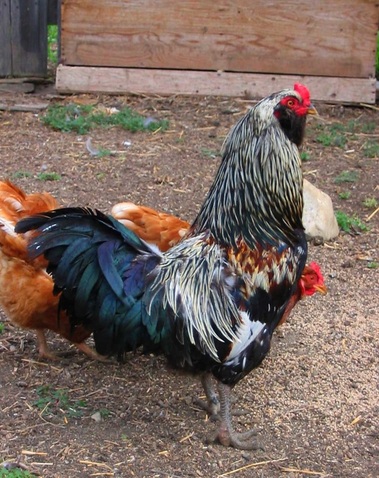|
You've heard no doubt of "The Land of Cotton." Well, I come from "The Land of 'Possum." It wasn't always that way in Lincoln County, Ontario. I was fourteen years old (although I didn't know it at the time,) when classmate Bollard Kluk came to school reporting that he had seen one of these improbable marsupials. No one believed him at the time, in fact, most of us thought he had simply seen a pale rat. (Bollard was blind in one eye, so naturally everything he saw looked twice as big.)
Nonetheless, it was no more than a couple of years later and they were showing up everywhere, town & country. Now, a 'possum is a very stupid animal. It has the most teeth of any mammal, but a brain about the size of a tomato seed. It is so stupid, that even with all those pointy teeth, it can't be induced to bite. Believe me, I've tested this theory. (I know, that's stupid too, but in my defense, may I offer the spectacle of the Lion Tamer.) It gets so worked up not knowing how to use its teeth, that instead of biting you, it just passes-out. It is so stupid, it doesn't cross the road, it walks right down the middle. (I've actually seen it walking down the on-ramp of a busy four-lane.) It is so stupid, that even with perfectly good countryside available to it on all sides, it is just as likely to choose to live in the city. (Couldn't resist that one.) It is so stupid, that when I take it into the elevator to visit my father, it doesn't know how to use the buttons. It is so stupid, it left a perfectly decent climate like Virginia to come to Canada. Which brings me to my point. Stupid as the 'possum is, when he arrives here in Canada, he sets up his livelihood such that he has the choice of whether or not to get up and go to work on any given winter day. Right about now, with the mercury dropping to the -40 range, i'm thinking about this. You see, I have set myself up such that even if it were hailing anvils, if it kept up, sooner than later i'd have to venture out in it. What bothers me is this: am I therefore Dumber'n a 'Possum? What is with that damn Arctic, anyway? Why can't it just stay put? What business does it have, how little manners does it possess, that it see nothing amiss about to sliding right on down here into the middle latitudes? It's ridiculous. And being a man, and not a 'possum, I have been spending a fair bit of time out in this frigid insubordination. The perversity of livestock is such that it is when the conditions are the worst that they most require your assistance. How do our livestock compare to 'possums? The chickens don't come out much in this, and their egg-production drops precipitously. (Last week we were up to over 50 eggs a day, pretty good for mid-winter, now we're down to a dozen.) The pigs lay like sardines in a tin, nestled in a deep bed of straw. We've built a low ceiling, or pig-lid, over their bed in the corner of a calf-shed, about as high as their backs, and layered also with straw on top. This sort of thing greatly decreases the radiation of body heat into the upper reaches. This is why deer - and smart woodsmen - locate their cold weather camps beneath overhanging evergreens. The pigs, near-naked as they are, so almost human, so like my Uncle Adrian in the U.K., don't seem to suffer given these basic living conditions. The yaks are built for this. They get a little more serious about food, but being from high latitude Mongolia and other nasty places much like ours, they're still pretty mellow. Not so the horses - mellow that is. They get tough with each other when it's cold. In fact, you could tell how serious-cold it was just by watching their behavior at feeding time. When the Arctic, the lousy, filthy Arctic, the kick-you-when-you're down Arctic, the sneaky, conniving, double-crossing... When the Arctic slides down off its proper polar perch, the horses get serious about food, and the hierarchies are strictly enforced with bites and charges and flying hooves. Beyond this, though, I think they are even tougher than the yaks. While on occasion we have had a yak suffer from frost-bitten ear tips, none of the horses has ever had this issue. The milk-cow, on the other hand, is a wimp. She stays inside her stall in the barn throughout this transgression of the you-know-which part of the globe, and she wears her insulated jacket to boot. Cows are smarter than chickens, but not by much, so of all the large animals they adapt the best to confinement. There are no 'possums here. Anyway, who cares - I go out to feed the animals in the gloaming. It's a balmy -26. I am glad and impressed that the automatic waterer remains in operation. (The heated pump from the well is not.) I siphon some into a bucket to top off the chicken's water now put right inside their henhouses - they don't drink enough in this weather otherwise. All the chickens are in, save three Isa Browns. This is the variety that has been engineered to lay brown eggs in the battery barns. They are 'possum of the chicken world. There is nothing whatsoever wrong with their eggs, once the Isa is removed from the indecent conditions and food regimens of the big barns, but there is definitely something wrong with the chickens. They are the first to die under harsh conditions like these - or any conditions - they just don't hold up as well as the heritage breeds. They also seem to be instinctually challenged. In the summer, they linger about into the dusk, long after all the other breeds have gone safely to bed, risking the fangs of predators that the others understand, oblivious. And now, on this frigid night, here are three of these idiots, roosting on the ground outside. I go back to the house, and bring out an old copy of "Wild Animals of North America." I open it up to the 'possum section, and show them a particularly un-flattering illustration. I give them a good long look. I get no response. Disgusted, I pick each one up and put them in the warmth of the hen-house, with the responsible poultry. It is now full-dark, clear, and the temperature is dropping fast. Heading back to the house, I reflect as I always do, how amazing it is that no matter how cold it is, once you are out doing your thing in it for awhile, you cease to mind it anymore. It's actually quite refreshing. I am not so dumb as I am, after-all. And one thing I didn't point out about 'possums is that when winter comes and they grow their coat out, they are actually quite beautiful.
17 Comments
When you raise your own chickens from a mixed hatchery order, or as we mostly do, from chicks you hatched yourself, you eventually run into the problem of too many roosters. The ideal ratio is about 1:12 roosters to hens. You could go around doing counts, but that's hardly necessary, if you're hatching and raising your own birds. You'll know when you have too many roosters - the farmyard dissolves into avian chaos.
Every year at some point it happens around our farm. In doing the daily rounds you become aware that the ambiance, the energy about the place, has ceased to be one of balance and peace. And it doesn't take long to pinpoint the reason: everywhere you look there are newly matured roosters in frenzied pursuit of hens, sometimes two or three on one, and more roosters pursuing the pursuers. Crazed cackling fills the air with little respite. The hens are understandably stressed and egg production begins to drop. The roosters are stressed too, with an adversary at every turn. There's no way around it, it's time to "cull" - read: kill - a bunch of roosters. So we killed roosters this past weekend. Killing things is never particularly pleasant, being the very definition on some level of excess violence, even when done humanely. Yes, you do it in as instantaneous and stress-free a fashion as you can devise, but the end result is nonetheless the termination of life. Which, for us, always leads to much reflection and discussion, before, during, and after. I think one of the things that would shock most non-farm folks should they begin farming, and on the other hand, one of the most valuable lessons most folks today are not receiving, is the amount of baseline violence that must go on just to sustain life and maintain order. Soldiers like to remind us of this. And if the farm is indeed a little ecosystem symbolic of the larger workings of the living earth, then i'd have to say they are correct, at least in principle. For sooner or later (probably sooner), if you are farming as farming is meant to be done, in a mixed and sustainable fashion, you are going to have to kill something. It may be an old breeder that is suffering, it may be an injured animal, it may be a meat animal, it may be a predator, it may be rodents in the vegetables or the granary. There is going to be killing to do. Sometimes, it becomes a daily ritual. (By the way, please note we aren't trying to dupe you, morally swindle you, to evade accountability with sanitizing terms like "harvest" in this post. Crops are harvested. Animals are killed, slaughtered.) There are those who argue that this is one of the problems with farming, that it pits man violently against his fellow creatures, against nature, forgetting that life itself pits pretty much all creatures against their fellow creatures at regular junctures, that this is nature, and that in fact what ensues is actually preferable to the sorts of situations that develop when not enough of this sort of baseline violence occurs. Things like disease and starvation and neuroses and psychoses due to overpopulation... and trouble in the henyard. This time, I chose to use the scoped .22 rifle for the task. My usual technique was to try to walk calmly amongst the birds with a long stick, lashing out swiftly at the right moment to stun the bird and then quickly slitting its throat. I reasoned that this was less stressful than catching them and hanging them up and otherwise terrorizing them. But sooner or later they catch on, and panic ensues. So I further reasoned that if I just strolled about calmly with this accurate little rifle loaded with the lightest and least dangerous rounds available for the task - the .22 "short" - I could "reach out" from a non-invasive distance and deliver the coup-de-grace without producing any panic whatsoever. This proved to be largely correct in practice. I would aim for the head, and if my aim was true, Andrea would then slip smoothly in with a sharp Bowie and slit the throat to make sure of the outcome. The other birds just seemed curious, or puzzled, although some of the hens went immediately haywire, attacking the rooster in his throes and pecking savagely wherever blood showed. (Maybe these were the ones with a score to settle.) And as anyone who has ever done any amount of killing will tell you, sooner or later things do not go entirely smoothly. This is inevitable. Your job then is to act quickly and decisively to reduce any suffering. This may sound unpleasant, and it certainly is. But we have found there is nothing like accepting this responsibility for arriving at a deeper understanding of our basic contract with life, the breach of which we enter into at immeasurable peril to ourselves and other life forms. We expect it is as true in this case, as in so many others, that we lose far more than we gain by "outsourcing" a vital act. We killed thirteen roosters in all, gutted them and put them in the freezer for later stewing (they are delicious!) The guts went to the pigs. I was happy for the firearm. Those opposed to firearms might do well to contemplate themselves on a farm, tasked with, let's say, killing something large - beyond a rooster - perhaps a pig or a steer, with something other than a gun. A knife or a spear, perhaps - maybe a club. Your odds of delivering that animal as humane a death as possible have just dropped precipitously. At any rate, we're glad the task is done. Perhaps we value the peace that has been restored that much more, relative to what was necessary to maintain it. |
AuthorHave a look at our "Education/Contact" page for info on the author. Archives
March 2020
Categories
All
|



 RSS Feed
RSS Feed
